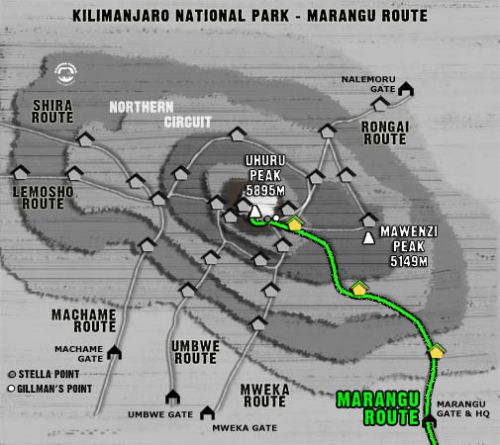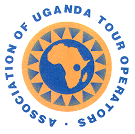Kilimanjaro Marangu Route (5 days)
The Marangu Route (also known as the Coca Cola route) is the most popular route, partly because it is the least expensive route.
For this route, you don't need any mountain climbing skills, but you must be fit.
The trek starts at Marangu Gate. Porters will carry all your personal items, equipment and supplies and a cook prepares your meals.
The Marangu Route has a well-defined path, which has been well set out and where most obstacles have been modified to make it friendly. Marangu is the only routes with huts (instead of camping).
It is a very scenic route with good views of Mawenzi and chances for viewing wildlife.
Marangu is (after Umbwe) the shortest route to the summit. This is not always the best way due to a shorter acclimatisation period.
To have better acclimatization it is possible to spend an extra acclimatisation day on the mountain. This extends the route to 6 days, greatly increasing your chances of reaching the summit.
Hut accommodation on the Marangu Route forms the main difference compared to the other routes. It offers you the relative luxury of being able to sleep in huts along the entire route.
Mineral water, soft drinks, chocolates and beers are also sold at all the camps on this route.
For the 6-day route, add an additional acclimatisation day at Horombo Hut on the itinerary below (an extra day between day 3 and day 4).
On the extra day you can make a scenic walk towards Mawenzi Hut, passing the Zebra Rocks on the way (about 3 hours up and 1,5 hours down).
The extra day helps to get used to the high altitude.
Highlights
- Kilimanjaro
Video
Route
Day to day program
Kilimanjaro Airport - Moshi Town
Arrival at Kilimanjaro Airport in the evening, meet and greet by your guide, then make a short transfer to Moshi Town (35 minute drive) to the Hotel for an Overnight. Briefing about the Kilimanjaro climb by your guide. Your Kilimanjaro guide will also check your equipment. Anything missing can be rented the next day.
Moshi Town – Marangu Gate – Mandara Hut
Marangu Gate (1.850m) - Mandara hut (2.700m)
Pick up from the hotel in Moshi Town, do some brief shopping around town before we leave the town and drive to Marangu Gate. Meet your Kilimanjaro team: guide, assistant guide, cook and porters.
The hiking starts to ascend on a cleared ridge trail through the rain forest. The forest, suffused with mist and dripping with beards of moss, is also where most of Kilimanjaro's animals are found. (An alternative and more scenic parallel forest trail is possible). After some hours walking through the misty forest we reach Mandara Hut. This is a group of wooden A-framed huts in a forest clearing. Each hut features 6 to 8 sleeping bunks with solar generated lighting. The total capacity of the camp is 60 climbers. Water is piped into the camp from springs above and there are flushing toilets. After a good and warm dinner we take a good rest.
Mandara Hut – Horombo Hut
Mandara hut (2.700m) - Horombo Hut (3.700m)
After a good breakfast we start hiking again. The first part leads us through the misty forest, until we reach Maundi Crater, where the forest emerges into moorland. It is well worth a short detour to walk up the rim of the Maundi Crater for your first really impressive view of the Kibo Crater. On a clear day, Kibo Peak will glimmer in the distance, showing off her majestic glaciers in the morning sun. In the open moorland you will see some of Kilimanjaro's most spectacular plants - the endemic giant lobelia which grows up to 3 m in height and the giant groundsel which can reach heights of 5m! After a beautiful walk we reach Horombo Hut, where you will have hot washing water and a good warm meal. Overnight in one of the huts.
Horombo Hut – Kibo Hut
Horombo Hut (3.700m) - Kibo Hut (4.700m)
After breakfast we ascent into the Alpine desert habitat. We walk through this strange and beautiful landscape to Kibo Hut. On our way we pass the last point where we will get our water for 2 days. Horombo Hut is a stone build block house which has beds for 60 climbers, but no streams with water nearby. It is however possible to buy mineral water and soft drinks at the camp office. There are platform toilets behind the hut. The summit is now a further 1.195m up and you will make your final ascent the same night. To prevent freezing it will be wise to carry your water in a thermal flask!
Kibo Hut – Uhuru Peak – Horombo Hut
Kibo Hut (4.700m) - Uhuru Peak (5.895m) - Horombo Hut (3.700m)
Your guide wakes you up before midnight and after a hot cup of tea and some biscuits you will start your trekking to the summit! When we reach Gillman's Point (5.700m / 18,700ft) we see a spectacular sunrise with Mawenzi in the background. We take a short rest to enjoy the spectacular view of the sunrise and Kibo Crater. We continue to walk on a relatively flat path, surrounded by beautiful glaciers, to reach the summit of Mt. Kilimanjaro, Uhuru Peak (5.895m / 19,340ft). Enjoy your accomplishment and a day to remember for the rest of your live! After taking photos we start to descend to our base camp, Kibo Hut (2 to 3 hours walk). We reach the camp, where we will have a rest and a good lunch. After lunch we descend to Horombo Hut (about 3 to 4 hours). Exhausted, proud and excited we will have a well-deserved dinner and very good sleep.
Horombo Hut – Marangu Gate – Moshi Town
Horombo Hut (3.700m) - Marangu Gate (1.850m)
After a good night's sleep we start our final descend to Marangu Gate. We go through the misty and beautiful forest again, all the way to Marangu Gate. The monkeys say goodbye and we realize we are about to end this great experience. After getting our certificates we will celebrate our Kilimanjaro adventure with our guides, cook and porters. We all did a great job! Transfer to your hotel for your much-needed shower and very comfortable bed.
Accommodations
Legend: BB = Bed and Breakfast
Prices 2024
Price on request, please send an email to mail@kazingatours.com
Includes
- Airport and destination transfers
- Meals mentioned in your hotel
- All meals (breakfast, lunch and dinner) and drinks during the tracking
- Accommodations (hotel and huts)
- Knowledgeable guide, assistant guide, porters, cook
- Rescue and entrance fees to the Kilimanjaro National Park
Excludes
- Flights
- Visa for Tanzania
- Insurances
- Beverages
- Personal things like sleeping bag, rucksack, footwear, other clothing etc.
- Tips and personal expenses such as laundry and communication
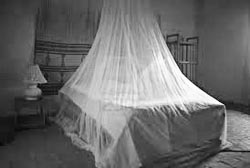 A certificate proving that you have received a yellow fever vaccination is obligatory. Furthermore all required inoculations must be recorded by your health practitioner on a valid vaccination certificate. You must carry this document with you throughout the tour. All visitors should take malaria prophylactic drugs. We also advise that you bring a mosquito repellent with you. Always consult your doctor or pharmacist for up to date requirements, inoculations and personal recommendations!
A certificate proving that you have received a yellow fever vaccination is obligatory. Furthermore all required inoculations must be recorded by your health practitioner on a valid vaccination certificate. You must carry this document with you throughout the tour. All visitors should take malaria prophylactic drugs. We also advise that you bring a mosquito repellent with you. Always consult your doctor or pharmacist for up to date requirements, inoculations and personal recommendations!
Normally you need the following vaccinations (but please always consult a doctor):
- Yellow Fever (you must have this can even be checked on arrival, especially when flying within East Africa)
- DTP
- Hepatitis
For Malaria you need to take tablets, Malarone or Lariam. Malarone is mostly used (please always consult a doctor).
Hygiene is not at the same standard as in your home country, so we advise you to bring a disinfectant cream with you. Always drink bottled water instead of tap water.
To make the hike to the summit of Kilimanjaro as enjoyable as possible there are some general rules and regulations:
- Hikers attempting to reach the summit should be physically fit
- If you have a sore throat, cold or breathing problems do not go beyond 3.000m above the sea level
- Children under ten years of age are not allowed to go above 3.000m (9,800ft) above sea level
- If you have heart or lung problems do not hike the mountain at all without consulting your doctor
- Allow plenty of time for the body to acclimatize by ascending slowly
- Drink 4 liters of liquid each day, water is the best but fluid, juices are good supplements
- If symptoms of mountain sickness or high altitude diseases persist, please descend immediately and seek medical attention. Our rescue team is always stand by to render such services at most major huts/camp sites
- Always go as a group. Never walk alone
- Our experienced guides will always take care of you!
Good equipment is vital for an enjoyable trip. The following is a list of basic essentials:
- Sleeping Bag: A down or fiberfill sleeping bag rated at least "3 seasons", plus an insulation pad, such as "Karri mat", if camping.
- Footwear: Good, semi-stiff walking boots are suitable for most walks.
- Waterproof: A good waterproof jacket (with zip to assist ventilation) is essential. Waterproof trousers are optional.
- Rucksack: A 50-65 pack without a frame is preferable in Machame routes.
- Head Cover: A woolen hat or balaclava is invaluable.
- Trouser & Shirts: Wool breeches are ideal, corduroy acceptable. Trousers should be as windproof as possible. Long sleeved shirts, preferable wool, plus two thin jumpers are probably as much as is required for a short trip. A duvet jacket is luxury to have.
- Sun protection: A good sun cream, sun protection lip balm and sunglasses are essential.
Other useful equipment includes:
- Spare socks, shirt and trousers, mitts or gloves, torch, water bottle, small towel and wash kit, plastic bags, whistle and compass etc.
We can provide everything you need for your hike to the summit! We will check your equipment before the trekking and we will help you to get the right equipment when needed..
Ask use for a detailed list: kilimanjaro@kazingatours.com
Kilimanjaro is a photographer’s delight! During the trekking there are many great panoramas and landscapes. It is not always easy to make good photos. Our photographer, Vincent van 't Hof hiked to the summit using the Machame Route. Vincent is happy to share his knowledge about Kilimanjaro climbing and photography.
Ask any question to Vincent: vincent@kazingatours.com
All photos from the Kilimanjaro are made by Vincent
Photo tips for the Kilimanjaro trekking
- Bring 2 bodies with you to be sure one of them is always working
- Bring extra battery power. It is not possible to charge on the mountain and the low temperatures make the batteries last shorter
- Take enough memory cards with you, hiking is a unique experience
- Think about the lenses to bring. Most photos are made in the range of 24 – 105mm
- Extra lenses means extra weight, bit will also give you more opportunities
- Our porters can help to carry your belongings and extra lenses
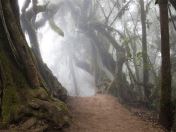
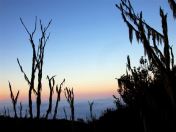
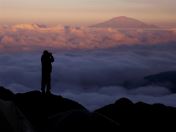
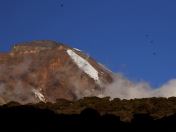
Photo Opportunities
During the Kilimanjaro trekking;
- During the first part you will go through a misty forest, very scenic
- Early morning (before breakfast) gives the best light, walk around and see some beautiful panoramas
- Mt. Meru is visible form many place
- The summit of Kili is visible from many places
Near the summit:
- To catch the first sunlight on the glaciers is a must!
- Sunrise is a magical moment
- Make your summit photos (you need a flah when you are very early)
- After reaching the summit it is possible to go into the crater or to walk towards the glaciers
- Don’t forget to make photos of yourself as well!
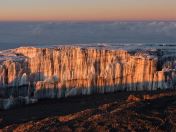
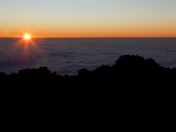
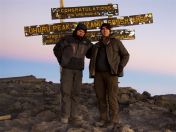
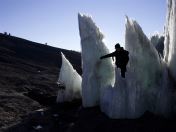
Enjoy your hike, it is a photographer’s delight!
On arrival on the airport our guide will be there waiting for you. During safari we use custom made safari vehicles, custom made for an optimal view of the wildlife. Safari vehicles (and small aircrafts) provide limited space for luggage. It is therefore recommended to travel with light bags since bulky suitcases will overload and might be difficult to be taken on board.
Visa - for those who require one - can be purchased in advance through the Tanzanian embassy or consulate in your home country. Visa can also be obtained upon arrival at Kilimanjaro / Dar es Salaam International Airport or at any overland border. The price for a single entry visa is USD 50 per person.
It is your own responsibility to arrange your visa(s) correctly and in time, but if anything is unclear of course we will be glad to assist you.
Note: This information is subject to change! Always consult the Tanzanian embassy in your country if you are not sure.
In most of the cities it is possible to withdraw money from an ATM. Travelers Cheques are not widely accepted and it is very difficult or impossible to pay by credit card outside the cities. The US dollar is traditionally the hard currency of preference. We advise to bring some Dollars for daily expenses and tips.
Dollar bills should not be older than 10 years.
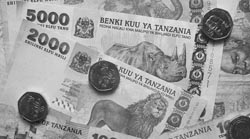
The unit of currency is the Tanzanian Shilling. Please check the latest exchange rates before you go to your destination. This will be a guideline. Please note you will get a better exchange rate in the bigger cities.
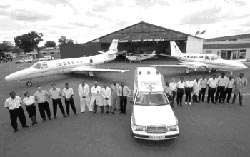
We advise you to apply for a Flying Doctors membership. The membership provides a quick and reliable air evacuation and medical care if needed.
AMREF Flying Doctors offers 2 covers (Annual and Short Term). You can choose between the Maisha Silver (Kenya, Tanzania and Zanzibar), Maisha Gold (Kenya, Tanzania, Zanzibar, Uganda, Rwanda and Burundi) or Maisha Platinum (Kenya, Tanzania, Zanzibar, Uganda, Rwanda, Burundi, South Sudan and Ethiopia).
Please check out the AMREF Flying Doctors website for more information and to become a member.
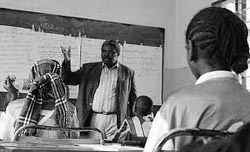 The national language of Tanzania is Kiswahili but English is widely spoken and is the main language in the tourist areas.
The national language of Tanzania is Kiswahili but English is widely spoken and is the main language in the tourist areas.
Tanzania is a tropical country, with high temperatures along the coast and at lower altitudes (especially in the Southern Part). The Northern part is at higher altitudes (except for Lake Natron and Tarangire).
Areas around the Ngorongoro Crater, Mt. Kilimanjaro, Mt. Meru and Arusha are generally cooler.
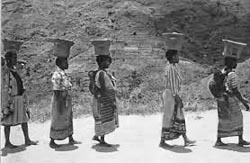
Daytime temperatures are generally warm to hot, so bring lots of light clothing. Evenings are cooler, especially at higher altitudes, so carry a couple of light sweaters too.
Those who intend to do mountain hiking will be exposed to alpine temperatures and should pack accordingly.
Don’t forget to bring a hat, sunglasses and a waterproof jacket. During safaris we advise to avoid black and dark blue clothes (because they can attract tsetse flies). For hiking and walking safaris Solid walking shoes and sturdy clothing are ideal for forest walks.
If you are planning on doing a community walk or visit the local people, we advise you to wear appropriate clothing. For example women putting on long skirts and a top that covers the shoulders.
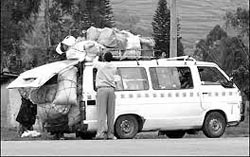 A valid passport is mandatory (passport must be valid for at least 3 months after re-entry) and visa requirements for all countries you are planning to visit should be checked before you travel.
A valid passport is mandatory (passport must be valid for at least 3 months after re-entry) and visa requirements for all countries you are planning to visit should be checked before you travel.
To make the most of your visit to the game reserves and national parks, we advise you to carry binoculars and field guides.
Photographers will need a zoom lens for wildlife (70-300 or more). Please make sure to carry enough memory cards with you. Toiletries and other essentials can be bought in the cities.
A torch (flashlight) can proof to be very useful
We advise you to take an international adapter with you for your electric equipment. The system used in Tanzania is the British system. In most lodges it is possible to charge your batteries.
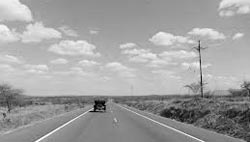 Driving in Tanzania is on the left-hand side.
Driving in Tanzania is on the left-hand side.
Visitors without experience of African roads are advised to travel with a 4x4 vehicle driven by a knowledgeable driver/guide, rather than self-drive.
All our guides are well trained in "Defensive Driving".
Please mind that washrooms along the road are sometimes not to European standards, for example squatting toilets, no flushing toilets or no toilet paper available. Like the locals say: T.I.A. This Is Africa.
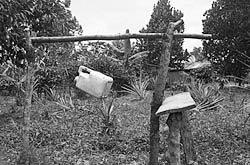 Bathroom facilities and accommodations can be more basic when traveling on a medium to low budget. In the eco lodges mind that the water reserves are limited and in most cases there are no sockets in the room, but you can always charge your devices at the reception.
Bathroom facilities and accommodations can be more basic when traveling on a medium to low budget. In the eco lodges mind that the water reserves are limited and in most cases there are no sockets in the room, but you can always charge your devices at the reception.
 Tipping will always be appreciated. It is normal to tip 5-10% in hotels and restaurants. Guides, drivers and carriers should always be tipped. Indication: for carriers USD 1-3 and for your driver/guide USD 5-15 per day, depending on the group size, number of days and your satisfaction.
Tipping will always be appreciated. It is normal to tip 5-10% in hotels and restaurants. Guides, drivers and carriers should always be tipped. Indication: for carriers USD 1-3 and for your driver/guide USD 5-15 per day, depending on the group size, number of days and your satisfaction.
The Lonely Planet and Bradt Travel Guide are the most detailed guidebooks for Tanzania. For wildlife, the best guidebook is ‘Watching Wildlife East Africa’ from the Lonely Planet and The Bradt ‘East African Wildlife’. For birding, the best guidebook is ‘birds of East Africa’. It is advisable to get the most updated copy.

